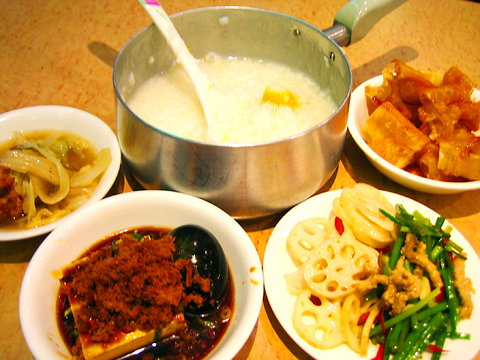Congee is a bland food. That's why it's a breakfast food in countries from Vietnam to Japan. But at the congee restaurants on Fuxing Road between Da'an and Technology Building MRT stations, it's a midnight snack.
Xiao Lizi is one of those restaurants with floor-to-ceiling windows revealing an ample buffet. A hostess stands outside telling passersby to stop for a snack. The place is less flashy but more popular than the others on either side and both floors fill up by 8pm, with customers streaming in and out into the wee hours of the morning. With a clean and simple decor, it's the perfect place to take a breather from your night on the town.
Congee can suffer from bad texture, which just compounds the problem of its blandness. But the congee you'll find at Xiao Lizi is a far cry from the leftover rice soaking in milky water that visits many a breakfast table in Taiwan. The ingredients are simple enough -- rice and water -- but a good consistency is difficult to attain with congee. If you cook it for too long, the rice grains disintegrate -- too short and the broth will be too watery. After cooking, the excess water can be drained to create a Western porridge-like consistency or left in to make it more like a soup. Xiao Lizi's congee is somewhere in between. Chunks of yam are thrown in to sweeten and thicken the mixture and the result is a pot of smooth, glowing goo.

PHOTO: MEREDITH DODGE, TAIPEI TIMES
The buffet table is the other option at Xiao Lizi. The first thing you must remember to put on your tray is a bowl of youtiao -- a stick of fried bread cut into sections to be soaked in the congee until it's tender and squishy.
Another typical congee side dish is thousand-year egg. One of the substances used to preserve the eggs (is it the charcoal or the lime?) reacts strangely with sweet flavors and if you take a bite of congee after a bite of the thousand-year egg without thoroughly rinsing your mouth, you will be greeted with a most unpleasant bitterness.
I found that, in general, the sweeter dishes went best with the congee, especially the deliciously crunchy lotus root and the tender leeks. If your stomach is up for it at that time of night, there are many other tempting dishes to try: stinky tofu, kung pao chicken, and several hearty stews. A selection of greens can be stir-fried or boiled to order.
If the thought of eating salty, fried dishes with sweet porridge turns you off, just ask for a pot of steamed rice instead.

June 2 to June 8 Taiwan’s woodcutters believe that if they see even one speck of red in their cooked rice, no matter how small, an accident is going to happen. Peng Chin-tian (彭錦田) swears that this has proven to be true at every stop during his decades-long career in the logging industry. Along with mining, timber harvesting was once considered the most dangerous profession in Taiwan. Not only were mishaps common during all stages of processing, it was difficult to transport the injured to get medical treatment. Many died during the arduous journey. Peng recounts some of his accidents in

“Why does Taiwan identity decline?”a group of researchers lead by University of Nevada political scientist Austin Wang (王宏恩) asked in a recent paper. After all, it is not difficult to explain the rise in Taiwanese identity after the early 1990s. But no model predicted its decline during the 2016-2018 period, they say. After testing various alternative explanations, Wang et al argue that the fall-off in Taiwanese identity during that period is related to voter hedging based on the performance of the Democratic Progressive Party (DPP). Since the DPP is perceived as the guardian of Taiwan identity, when it performs well,

The Taiwan People’s Party (TPP) on May 18 held a rally in Taichung to mark the anniversary of President William Lai’s (賴清德) inauguration on May 20. The title of the rally could be loosely translated to “May 18 recall fraudulent goods” (518退貨ㄌㄨㄚˋ!). Unlike in English, where the terms are the same, “recall” (退貨) in this context refers to product recalls due to damaged, defective or fraudulent merchandise, not the political recalls (罷免) currently dominating the headlines. I attended the rally to determine if the impression was correct that the TPP under party Chairman Huang Kuo-Chang (黃國昌) had little of a

A short walk beneath the dense Amazon canopy, the forest abruptly opens up. Fallen logs are rotting, the trees grow sparser and the temperature rises in places sunlight hits the ground. This is what 24 years of severe drought looks like in the world’s largest rainforest. But this patch of degraded forest, about the size of a soccer field, is a scientific experiment. Launched in 2000 by Brazilian and British scientists, Esecaflor — short for “Forest Drought Study Project” in Portuguese — set out to simulate a future in which the changing climate could deplete the Amazon of rainfall. It is